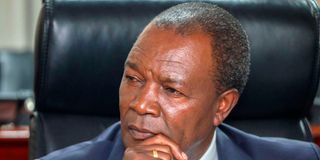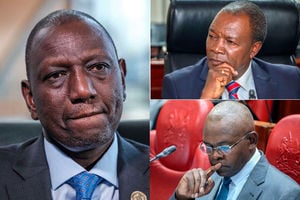
National Treasury Cabinet Secretary Njuguna Ndung'u.
The big news from this week’s Cabinet meeting was that the government has at last decided to shut all of its bank accounts by centralising and consolidating its cash resources into one system known as a Treasury Single Account (TSA).
The reasoning is simple. The existing cash management and banking arrangement systems are a big mess. Today, funds maintained by ministries, departments and agencies (MDAs) are scattered all over the place, in numerous bank accounts dispersed between the Central Bank and commercial banks.
It is an environment where MDAs maintain separate bank accounts for some budget payments, for projects, special funds, and for extra budgetary purposes. Regular transfer of funds between the numerous accounts are a common practice.
It is a total mess, to say the least. A 2012 study by the International Monetary Fund estimated that there were more than 10,000 bank accounts in multiple financial institutions, making it impossible for the government to establish its cash position at any point in time. The situation had led to pockets of idle cash in the banking system.
Yet, another weakness in the current system is that it allows ministries, departments and agencies that generate revenues in fees and licences to hold the money in multiple bank accounts – use part of the revenues generated to find their operations – and only remit to the national exchequer what they deem fit.
But the most grotesque weakness of the messy situation is the fact that when the government goes to the market to borrow through those weekly Treasury Bills and Monthly Treasury Bond auctions, a significant proportion of the money it will be borrowing will be its own money that commercial banks have been keeping in the form of idle money in the numerous accounts held by MDAs and agencies across the banking system. Does the National Treasury have the capacity and skill sets to deliver this important transition within this financial year? What should we expect to happen in the medium term?
Let’s all wait and see. If President William Ruto’s administration manages to implement and deliver a TSA system as announced by the Cabinet within this financial year, the administration will have gone down in history for having implemented implementing the most significant public finance management reform in Kenya in decades. We have been talking about introducing a TSA for a long time. I first saw the idea mentioned the Public Finance Management Bill of 2012.
In May 2012, the government engaged a technical mission from the IMF comprised of public finance management specialists to study and review its cash management and banking arrangements. The most significant finding of that study was that the government lacked knowledge and control over bank balances located outside the Central Bank. That review also concluded that the government badly needed to implement a TSA system to allow the Ministry of Finance and Planning to minimise the volume of idle balances in the banking system.
The experts argued that Kenya needed to transit in a public finance management environment where the government is able to fund its expenditure in a timely manner and meet its obligations as they fall due. What are the likely consequences for the banking sector? How the banking sector responds to the new decision remains to be seen.
In Nigeria, the introduction of a TSA was announced by President Mahmoud Buhari, who also gave banks September 15, 2015 as the deadline to transfer all public funds in their books to the TSA. In the first week of implementation, a wave of uncertainty swept through the banking system as commercial banks started to grope on how to comply with the directive. President Buhari had pitched implementation of a TSA as part of a drive to fight corruption and aid transparency in management of government finances. But analysts predicted that implementation of the TSA would drain liquidity from the banking system, put pressure on lenders to increase lending rates and introduce inflationary pressure in the economy.
Analysts also argued that liquidity problems would be more evident in banks that had been keeping large government deposits in their cover to advance loans. In terms of fundamental reform of public finance management reform, the introduction of a TSA is only the beginning.
The elephant in the room for Kenya still remains reforming accounting by transiting from a cash-based system to accrual accounting. In June 2022, then-Treasury CS, Ukur Yatani, sent a public notice saying that the government would start shifting from the cash-based system to double-entry accrual accounting. Very little has been heard from the National Treasury ever since.







